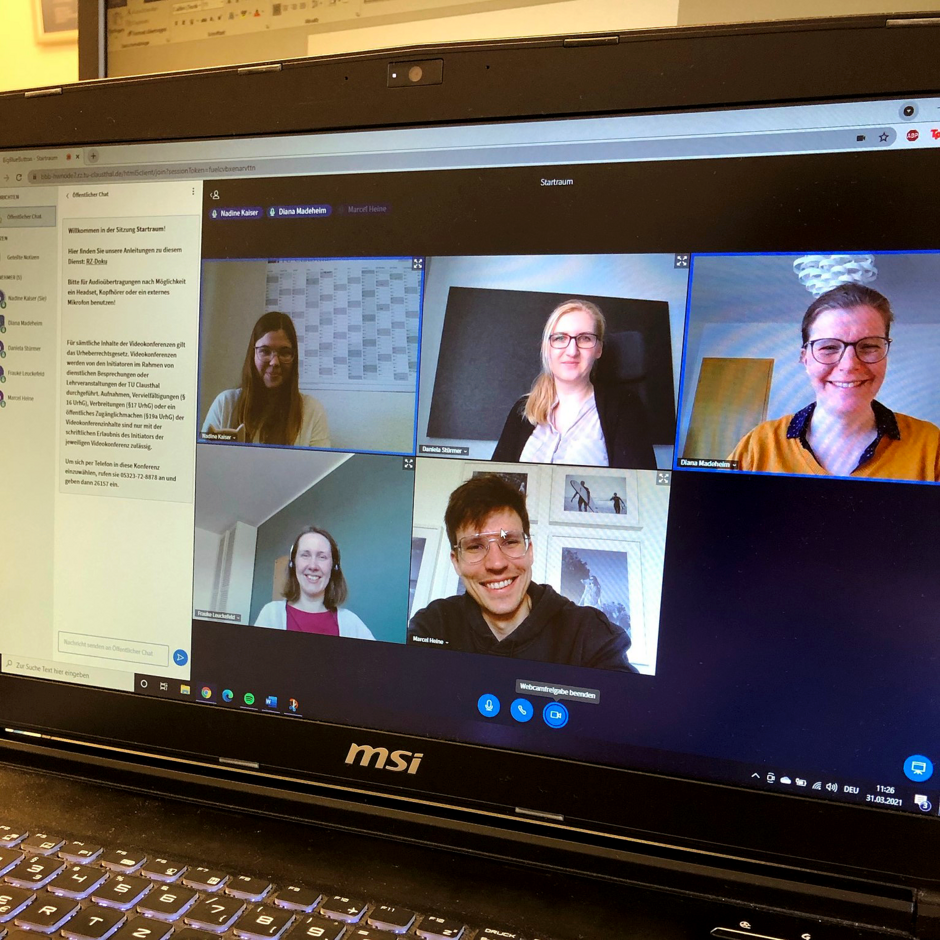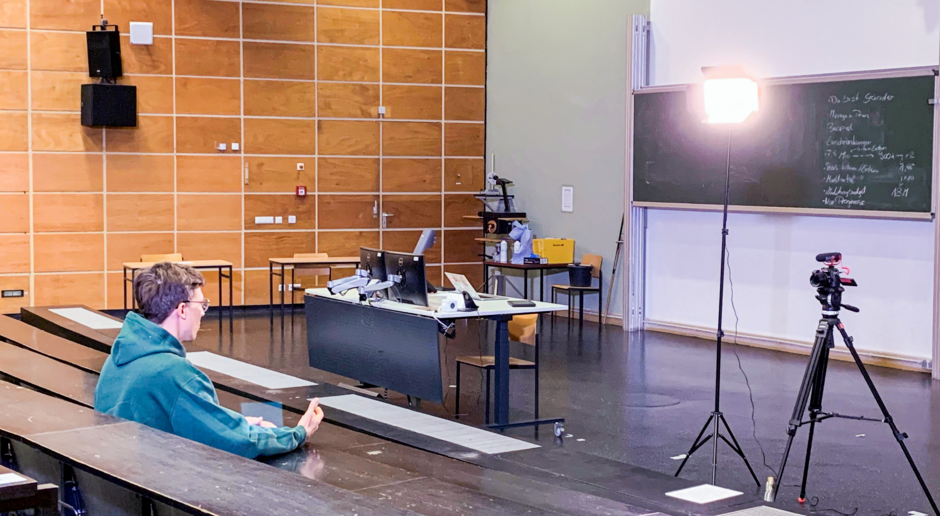
The start-up service at Clausthal University of Technology: Marcel Heine, Daniela Stürmer, Frauke Leuckefeld and Diana Madeheim. The team will support you with all topics and questions relating to start-ups: from brainstorming to business development and financing. The foundation of the start-up service is the "Gründungskultur@TUC" project, which is funded by the "EXIST-Potentiale" program. The aim is to promote the start-up culture at Clausthal University of Technology and to provide you with skills such as entrepreneurial thinking and action. To give you a brief overview, I spoke to the team and asked them to explain what exactly you can expect.
Who are you and what is your role in the project?
Marcel: I'm Marcel and I've been working for the project since October 2020. I'm mainly responsible for start-up consulting and also do project management for EXIST. After my bachelor's degree, I worked in finance and ended up as a business controller in a Berlin startup after several detours. My work there sparked my interest in the topic of start-ups. My studies of T-BWL in Clausthal and my parallel work as an independent innovation manager then brought me here. Students can come to me for advice with any business-related questions. This can be anything from market analysis to the entire business plan, including funding and financing options.
Daniela: Like Marcel, I joined the Start-up Service at the beginning of October. My responsibilities lie in the area of idea development and consulting. I studied industrial engineering in Clausthal and then worked for seven years in industry as a project manager in the fields of energy management and supply chain management. I then set up my own business as a consultant and during this time I became very interested in identifying customer needs and considering which business ideas could be developed to meet them. I think it's important to impart this knowledge to students and show them that it's possible to do something other than pursue a career in an existing company. I run workshops on these topics and support Marcel with start-up advice.
Diana: I am responsible for public relations in our project. My job is to communicate our content to the students. We have already launched our own website for this purpose and are planning various social media channels, a blog, a podcast and explanatory videos for the future. I also help Daniela with the organization of our workshops. I originally come from the cultural sector and have worked at various theaters in Germany and Austria, including in the areas of public relations and project management. Most recently, I worked in Stuttgart as project manager for the major events Long Night of Museums and Stuttgart Night.
Frauke: I'm Frauke and I joined the project in February. I am responsible for identifying and publicizing courses on the key qualifications of entrepreneurial thinking and action. At the moment, there are already a few courses that cover this key qualification, but they are not listed anywhere and most students can only get credit for individual courses, if at all. That's why my aim is to show students the full range of courses on offer, develop them further if necessary and ensure that they can get as much credit as possible for their studies. So I tend to work in the background, but I am considering approaching the students and asking for input when it comes to expanding the existing range of courses. Before my time here, I worked as a career service advisor at another university at the interface between university and professional life. My motivation back then was to support young people on their way into professional life and that's exactly what motivates me now.

What exactly do you offer students?
Marcel: In principle, anyone interested in founding a company can contact us if they have an idea or want to do something of their own. You can reach us by phone, email or via our contact form. This gives us the opportunity to prepare personal advice and initial questions. If you don't have a concrete idea yet, you can also get advice from us.
Daniela: We can help students to find out whether their idea makes economic sense and whether there is a market with suitable customers for the service or product. In the meantime, our first workshop has already taken place, which also focused on trends and innovative product ideas.
You have already received a few contact requests so far. What were they about?
Marcel: We've had a wide variety of inquiries so far, from initial ideas to finished prototypes. Some inquiries come from doctoral researchers, for example, who want to see whether they can also achieve commercial success with their work. Many ideas are technically mature, but not commercially viable.
Frauke: But of course the start-up service is there for anyone interested in setting up a business, not just doctoral students.
Daniela : Exactly, we don't just look after scientific or technical start-ups, of course, we also welcome all other start-up topics.
How does it work if I want to start up and don't have an idea yet?
Daniela: In principle, you can contact us first and tell us what you want to do. Then we'll have an initial consultation together. But it can also make sense to come to one of our workshops. These will mainly be about how to develop an idea, how to know whether an idea has potential and how to implement this idea. We can also connect people on these occasions: for example, a technician with an idea and a business graduate who is well versed in finance and marketing.
What other opportunities do you have to connect people with each other?
Marcel: Our aim is to keep expanding our network. We are looking for mentors who can also provide expert advice, including within TU Clausthal. For example, I got to know some investors through Dr. Steiniger's Digital Entrepreneurship lecture, in which students developed business ideas, wrote a business plan and presented it to a jury. The jury consisted of two Augsburg investors and myself. What does that mean? More contacts and more opportunities for certain start-up ideas.
What do students have to consider when applying for EXIST funding and what other financial support can they expect?
Marcel: The EXIST program is an initiative that promotes start-ups at universities by students, academic staff and graduates. There are two options for financial support in this program: the EXIST start-up grant and the EXIST research transfer. The basic requirement for both funding options is that the start-up idea must be innovative or a business-based service. There is also the Niedersächsische Förderbank and the Wirtschaftsförderung Region Goslar with various funding concepts. You can also find all information on financing options on our website.
Curious? Then take a look at the start-up service page at https://www.gruendung.tu-clausthal.de?
